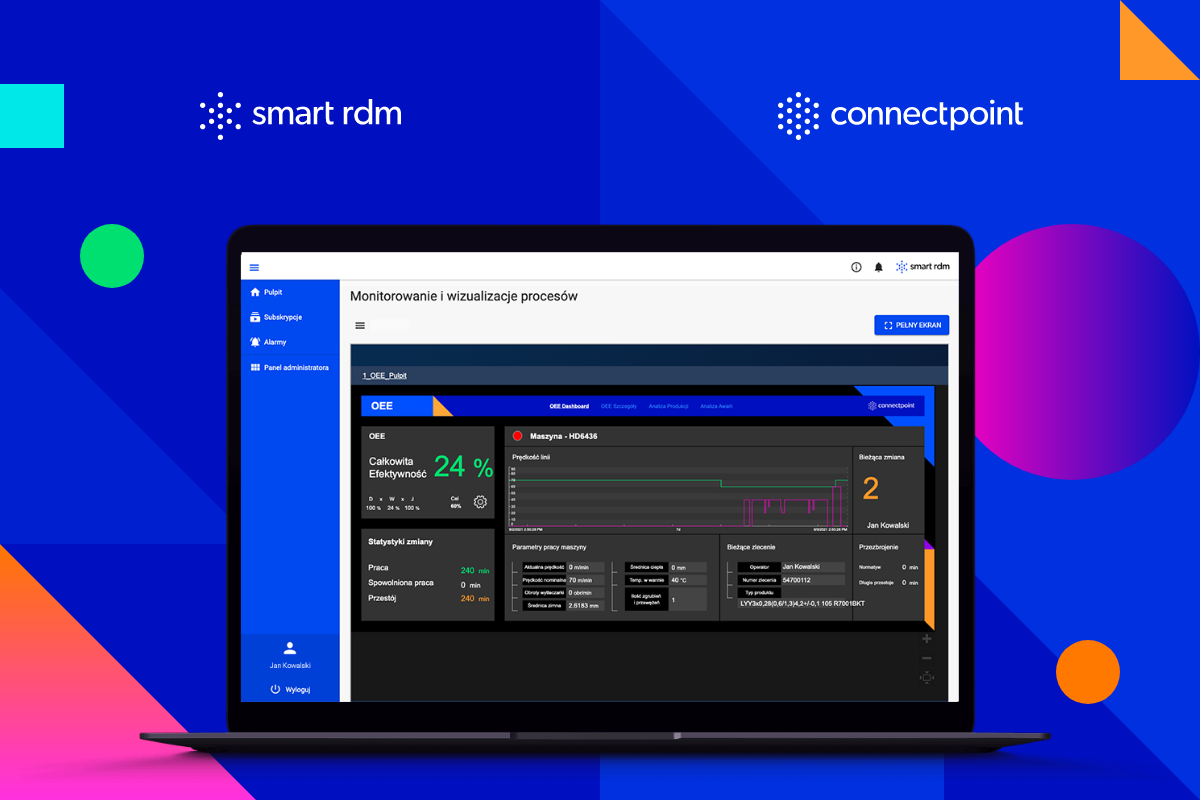ConnectPoint x Twinings of London: What does digitisation mean for the FMCG industry?

The article was originally published in Portal Spożywczy in polish.
Twinings was established in 1706 and is one of the oldest premium brands in the world. Twinings tea is available in 115 countries, and its production takes place in factories located in Great Britain and Poland. Up to 70 tons of tea is produced there every day. The Polish factory in Swarzędz was opened in 2011. It makes 600 different types of tea. To improve the work of the Polish factory, the tea producer decided to cooperate with ConnectPoint in the area of analytics.
Digitalization of the FMCG sector
Twinings' needs were in line with the challenges that most manufacturing companies face. The development of digitalization in the production plant translates, among other things, into an increase in machine and equipment utilization efficiency (OEE). Integrating automation systems with IT and business applications within a single system makes it possible to monitor production in real-time. This overview translates into reduced losses during production. Analytics also help you manage your machines, enabling you to fulfill orders in less time. More and more companies are aware of this but are not yet opting for analytical solutions in their plants.
- Digitalization in the food industry is still rare on the Polish market. Most companies limit digitalization to production process control. However, when it comes to production data and building digital models of devices based on manufacturing process technology, such solutions are a new phenomenon on the market, not very popular in Poland yet. On the plus side, more and more companies are aware of the development of technology. They know that they need to invest to perform even better, that this is the path they need to follow, and thus they are looking for tools to improve their business - explains Tomasz Węgrzyn, OSIsoft Team Leader at ConnectPoint.
- To a large extent, companies realize that they need to move towards widespread digitization of processes to increase the efficiency of their businesses. Every commercial company lives on sales, so even more production will translate into profit. However, to achieve even better results, the process of digitalization and analysis must be carried out in the company - adds Agnieszka Szlemińska, Sales Director at ConnectPoint.
When investing in IT solutions from the area of advanced data analytics, it is crucial to define your own needs and goals in this area and be open to new investments.
- Many companies are not ready for digitalization because their machine park and systems responsible for production are not prepared for integration with analytical or data management systems. Often the entry of such companies into the digitalization process is connected with a considerable investment related to the modernization of automation systems - explains Tomasz Węgrzyn.
- We have companies in Poland that have implemented processes for basic analytics, i.e., they can count production efficiency and effectiveness, downtime, waste vs. good quality products. However, when it comes to investments in analytics related to artificial intelligence, Poland is at the initial stage - adds Tomasz Węgrzyn.
.png?width=800&height=571&name=twinings-2%20(1).png)
Twinings x ConnectPoint joint project
ConnectPoint offers IT solutions in advanced data analytics for industry, energy, and utility sectors. The company specializes in IT/OT integration, which means managing the entire process of collecting, organizing, and analyzing operational data. Additionally, ConnectPoint builds systems that enable effective collaboration between Operations, IT, and Business.
One of the companies that decided to take advantage of ConnectPoint's offer was Twinings. The tea producer set two main objectives for the cooperation. The first one was to optimise the working conditions of the machines. The second one was to create a central platform for monitoring and analysing data from the machines, connecting IT and OT systems. Thanks to this platform, both factory employees and management receive information on how to handle production better. The key value was integrating the production process (machines) with business systems and introducing the possibility of analyzing correlations between orders (data from SAP, e.g.) and operational data. This big picture on production translates into production optimization.
- We want to continuously improve the efficiency of our processes by working not necessarily harder but smarter, using the latest technology. The pursuit of operational excellence is embedded in our manufacturing operations. As we strive for perfection, we want to support our decisions and tactical and strategic actions with advanced analytics on historical data and real-time statistics. This is only possible when we collect in digital form all critical data and information from the processes. - explains Marcin Gad, Operations Director at the Polish Twinings factory.
- The integration of all production data in one place makes it possible to compare production in terms of machine parts consumption, electricity, gas, or carbon dioxide emissions. As part of the digitalization, we collect information from all machines and auxiliary systems such as the ERP system. Our systems organize the data, and then we can transparently observe and analyze it in real-time at every organizational level in the company. It is essential to distribute reports so that all authorized people in the organization can access them. This applies not only to people who deal with production but also to reporting according to the type of information, planning, strategy, financial management, or infrastructure. Our thorough analyses allow for an improvement of the company's operations on many levels - says Tomasz Węgrzyn.
- We support our clients as much as possible from the tool side. We show how to integrate and use scripts for advanced analytics, but we also provide substantive support in advanced analytics, e.g., in budget planning - he adds.
ConnectPoint has developed for Twinings a Central Data Repository based on the OSIsoft PI system. Data from dispersed sources such as production lines, SharePoint, external Excel files, SAP, building management systems were integrated into one system. This solution enabled advanced analysis, real-time production monitoring, and calculation of performance indicators in various aspects.
In a short time, Twinings received a system ensuring real-time monitoring of the whole production process, in particular: facilitating and speeding up the identification of areas requiring immediate support; on-line reporting of the status of production machines; on-line reporting of the values of key parameters (OEE; Waste); bottleneck alerts; on-line reporting of the status of production orders; minimising overproduction.
What does Twinings have planned next in the area of digitalisation?
- We are in the process of automating reports and production dashboards for the core process (filling and packaging), which will reduce the burden on Production Leaders and free up their potential to analyze and act on performance improvements. We try to follow the emerging needs and challenges, treating digitalization pragmatically - as a tool supporting the pursuit of operational excellence: reducing losses, increasing cost efficiency. - says Marcin Gad from Twinings.
- Digitalization supports the optimization of the production process and improves its efficiency, thanks to which we produce more high-quality products for the market in a shorter time. So we are not talking about savings for the company, but about even higher profitability - analyzes Agnieszka Szlemińska from ConnectPoint.
Analytics helps protect the environment
More and more manufacturers, not only in the food sector but also in other industries, are now focusing on sustainability. Advanced analytical measures help to reduce utilities consumption and thus have a positive impact on the environment.
- Large FMCG companies declare the desire to be environmentally friendly in their production, and we support them in this. Our analyses allow us to monitor utilities and optimize their consumption, which translates into care for the environment and savings. With the correct data flows, we can check shop floor humidity, machine speeds, waste, decide whether to increase or decrease air conditioning, machine positioning. By correlating such data from the production hall, we can optimize work there in terms of power, gas, or water, which translates into lower electricity consumption," explains Tomasz Węgrzyn.
Additionally, observation and analysis of all processes allow for quick reactions in case of various events on the production floor.
- Digitization is also about alerting, finding anomalies, and reporting on them. Analytics is not only a model of counting indicators but a whole system of notifications, alarms, information about failures, and downtime. Therefore, it isn't easy to achieve optimization in production processes without analytics. On the other hand, knowing about the mentioned activities, we avoid undesirable situations in the company. Analytics allows us to manage maintenance, time for quick intervention, and preventive actions, thanks to which we avoid "fires" in the factory - says Tomasz Węgrzyn.
How it works - trends in digitalization
As we have already mentioned, ConnectPoint offers IT solutions in advanced data analytics for companies from the food industry, industrial sector, energy, and utilities.
- Our main tool to support production is our Smart RDM application, which uses the latest trends in digitalization. The most visible trend will be the reliance on cloud platforms, which we use to the full extent in our application - says Tomasz Węgrzyn.
- The second trend is to use artificial intelligence algorithms for production data analysis. Our Smart RDM application allows us to use the cloud as a computing platform for advanced data analysis - adds Tomasz Węgrzyn.
In summary, the development of digitalization and analytical processes translates into optimized production and, above all, even more profit for the company.

Poland Office
ConnectPoint Sp. z o.o.
ul. Zagadki 21
02-227 Warsaw
Poland
German Office
ConnectPoint GmbH
Oberbilker Allee 165
40227 Düsseldorf
Germany
Polnisches Büro
ConnectPoint Sp. z o.o.
ul. Zagadki 21
02-227 Warsaw
Polen
Deutsches Büro
ConnectPoint GmbH
Oberbilker Allee 165
40227 Düsseldorf
Deutschland
Polskie Biuro
ConnectPoint Sp. z o.o.
ul. Zagadki 21
02-227 Warsaw
Polska
Niemieckie Biuro
ConnectPoint GmbH
Oberbilker Allee 165
40227 Düsseldorf
Niemcy